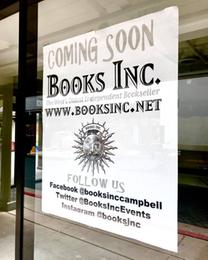 Over the past week, Shelf Awareness has examined how independent bookstores around the country navigate rising rents, lease negotiations and relationships with landlords. While every store's landlord and lease agreement are different, below are a number of common points taken from conversations with Michael Tucker, president and CEO of Books Inc.; Nina Barrett, owner of Bookends & Beginnings; Christine Onorati, owner of WORD Bookstores; John Evans, co-owner of DIESEL, a bookstore; Krijn de Jonge, co-owner of Queen Anne Book Company; and Annie Philbrick, owner of Bank Square Books and Savoy Bookshop & Cafe.
Over the past week, Shelf Awareness has examined how independent bookstores around the country navigate rising rents, lease negotiations and relationships with landlords. While every store's landlord and lease agreement are different, below are a number of common points taken from conversations with Michael Tucker, president and CEO of Books Inc.; Nina Barrett, owner of Bookends & Beginnings; Christine Onorati, owner of WORD Bookstores; John Evans, co-owner of DIESEL, a bookstore; Krijn de Jonge, co-owner of Queen Anne Book Company; and Annie Philbrick, owner of Bank Square Books and Savoy Bookshop & Cafe.
Do Your Research: Every bookseller with whom Shelf Awareness spoke emphasized the importance of doing one's homework before going into lease negotiations. In particular, the American Booksellers Association's ABACUS data was described as invaluable.
Educate Your Landlord: Booksellers may need to educate prospective landlords, as well as bankers, brokers and whomever else, about the financial realities of the book business and the very narrow margins with which bookstores operate. Booksellers should also take the opportunity to explain some of the less quantifiable benefits that bookstores bring as anchor tenants and community hubs.
Don't Force It: Several booksellers noted that having a below-market rent is a necessity for being able to survive in certain expensive parts of the country, and if a prospective landlord is unwilling to budge from a rent cost that's too high, then move on.
Don't Be Afraid to Ask for Concessions: When negotiating with landlords, booksellers shouldn't be afraid to ask for concessions, including things like not paying rent during a build-out or having floors redone and lighting replaced.
Keep an Eye Out: Booksellers may want to include language in their lease that would allow them to get out of it should the worst happen, and be wary of landlords charging "cost of living increases" above 3%.
Get to Know Your Landlord: Once a lease is signed, booksellers should try to see their landlord at least a couple of times per year, and not just wait until the lease is nearly up to contact them. Michael Tucker advised getting lunch or dinner with them twice per year or so; that way, the relationship won't only be about a legal agreement.
Diversify Your Business Model: To help defray the costs of rising rents or even things like the rising minimum wage, booksellers may want to do things like carry more high-margin sidelines or drive pre-orders and web sales. Christine Onorati noted that many booksellers cannot afford to "dig [their] heels in anymore."
Customers Can Help: In Evanston, Ill., a proposed real estate development that would've torn down Nina Barrett's building was defeated by her passionate customer base and community. And in San Francisco, a huge outpouring of community support made the landlords of Books Inc.'s Laurel Village store reconsider a massive rent hike.
The Ideal Arrangement: Several booksellers pointed to a lease where the bookseller pays a fixed percentage of the previous months sales as rent as the ideal scenario. John Evans noted that in those instances you are "truly a partner" with your landlord. Annie Philbrick also praised this model, but acknowledged that it requires a bit of luck in finding the right kind of landlord.
Previous articles in the series can be read in their entirety here. And for booksellers attending Winter Institute 14 next week in Albuquerque, N.Mex., Annie Philbrick, Michael Tucker and others will be on a panel about rent negotiations and landlords. --Alex Mutter

